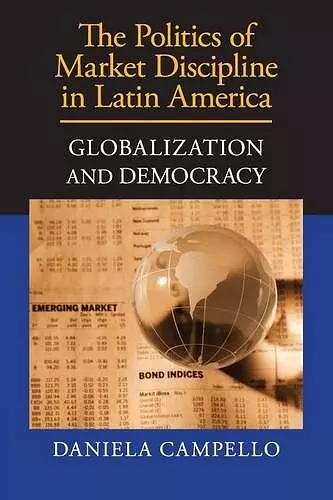The Politics of Market Discipline in Latin America
Globalization and Democracy
Format:Paperback
Publisher:Cambridge University Press
Published:21st Jan '16
Currently unavailable, and unfortunately no date known when it will be back
This paperback is available in another edition too:
- Hardback£90.00(9781107039254)

This book uses a multi-method approach to challenge the notion that financial markets exert a broad influence over economic policy making in emerging economies.
Daniela Campello uses a multi-method approach to challenge the notion that financial markets exert a broad influence over economic policy making in emerging economies. In Latin America, this influence varies between countries and over time, depending on cycles of currency booms and crises that are swayed by international commodity prices and US interest rates.The Politics of Market Discipline in Latin America uses a multi-method approach to challenge the conventional wisdom that financial markets impose broad and severe constraints over leftist economic policies in emerging market countries. It shows, rather, that in Latin America, this influence varies markedly among countries and over time, depending on cycles of currency booms and crises exogenous to policy making. Market discipline is strongest during periods of dollar scarcity, which, in low-savings commodity-exporting countries, occurs when commodity prices are high and international interest rates low. In periods of dollar abundance, when the opposite happens, the market's capacity to constrain leftist governments is very limited. Ultimately, Daniela Campello argues that financial integration should force the Left toward the center in economies less subject to these cycles, but not in those most vulnerable to them.
'Daniela Campello tackles a very controversial and perhaps most misunderstood topic in the political economy of contemporary Latin America: to what extent do global markets and foreign investors constrain governments, particularly those on the left, preventing them from pursuing redistributive policies voters demand? Her answer is sophisticated and unexpected. The book is a lasting contribution to understand globalization, the emergent left, and the politics of policy making not only in Latin America but elsewhere in the developing world.' Alberto Díaz-Cayeros, Stanford University, California
'It is widely recognized that financial markets discipline governments and induce even leftist rulers to adopt conservative, pro-investor policies. In this impressive book, Daniela Campello breaks new ground by explaining how and why this market discipline varies across countries and over time in Latin America. Campello supports her arguments through a rigorous set of formal models, statistical tests, and comparative case studies, setting a new standard for future scholarship on the politics of market discipline.' Kenneth M. Roberts, Cornell University, New York
'Campello's book will reshape our understanding of currency crises and their role in policy making, in Latin America and beyond. It traces the ebb and flow of conservative and radical policies to the relative availability of hard currency, itself a product of international commodity prices and interest rates, and in so doing forces us to rethink the incentives and constraints facing policy makers in a globalized world. This is an impressive and important book that will become a game-changer for the study of Latin American political economy and a necessary reference for the study of international political economy in developing countries more generally. By reshaping debates over the agency of politicians, given exogenous economic shocks, it will become a crucial piece in our understanding of policy studies more generally.' Maria Victoria Murillo, Columbia University, New York
'The widespread expectation is that capital mobility constrains the policy choices of elected governments, but Daniela Campello's lucid new book tells us precisely when and where mobile capital limits options for economic policy makers, especially those on the left. The theory is nuanced and compelling and should travel well beyond Latin America. This book is indispensable reading for everyone interested in the effects of globalization and the limits to democratization and redistribution in developing countries.' Ben Ross Schneider, Ford International Professor of Political Science, Massachusetts Institute of Technology
ISBN: 9781107649866
Dimensions: 230mm x 154mm x 14mm
Weight: 390g
254 pages